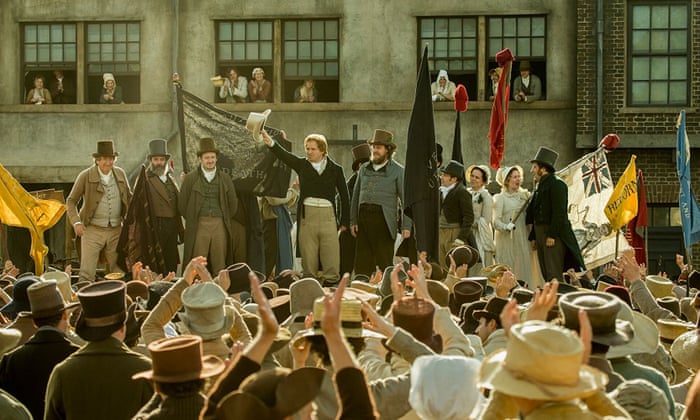
A review by Davide Monaci
“Peterloo” is a historical drama directed by Mike Leigh and focused on the Peterloo Massacre.
On 16 August 1819, during a peaceful demonstration in St Peter’s Field in Manchester, a group of soldiers and a band of cavalry charged into a crowd of approximately 100,000 unarmed people. Many of them were unable to escape the enclosed space: 18 people were killed and hundreds were injured.

To remind us of this event, Mike Leigh made a film about it, which was released in 2018. Although the film is about an event that took place two hundred years ago it has an impact on the present: Mike Leigh reminds us how to do politics, how to have healthy debates and exchanges of opinions.
Despite all expectations, the movie begins with the Battle of Waterloo, while the main event is shown only at the end. These two historical facts, apparently distant, are actually connected. Joseph, a soldier interpreted by David Moorst, is the connecting element between the two, as he takes part in both events. Paradoxically, what should be the more peaceful of the two will be for him the more tragic.
There is nothing heroic nor epic: the reality of the facts remains the priority. Mike Leigh, who also worked on the screenplay, tells what happened accurately. He stages disputes and doubts without answering them. During the entire film contrast between the majority of the population and those in poweris stark. The residents of Manchester (intellectuals, weavers…) want rights granted to them, while rulers are reluctant and want to keeptheir privileges. Among the protesters Henry Hunt stands out, interpreted by Rory Kinnear. A famous orator whose vanity is underlined by the haughty pose in his portrait. Among the conservatives is the odd, and indifferent figure of the Prince Regent (Tim Mclnnery). The glitz and shimmering colourssurroundingthe prince are in stark contrast to Manchester’s grey colour. Like puppets in the Regent’s hands, several magistrates act selfishly, trying to cut off any mediation with the people.
For almost the entire film the conflict occurs in words, through speeches. The narrative backbone of the film is eloquence, with a continuous alternation of speeches and riotous oratory . Weapons only appear in the final stages, unless words are considered a weapon.

It is interesting to note that there is not a real main character: each individual, someone more and someone less, has its own important role. Every word is to be heard, every face is to be remembered, every detail has its own purpose. This aspect of the film underlines how every single individual needs to be part of society. As history often taught us, change can only be collective.
Peterloo review by Vincenzo Cascone
“Peterloo” is a 2018 British historical drama on the Peterloo Massacre of 1819; it was written and directed by Mike Leigh. The film is set in city of Manchester, at the time of the second industrial revolution, with its factories and chimneys.
The young trumpeter Joseph (David Moorst) who miraculously survived the Battle of Waterloo returns home to his family of humble workers in Manchester. British people are starving because of unemployment and corn laws, they are treated with ferocity and injustice by an arrogant and violent government. Some radicals manage to gather crowds of people ready to demand parliamentary reform and an extension of voting rights by taking to the streets in protest. The London government, informed of the facts, prepares defend the privileges of the ruling class by sharpening its weapons.

The theme of the film is injustice: how a government may respond to the peaceful protest of exhausted people with violence; how judicial system ignores any right belonging to citizens such as habeas corpus.
The film shows the poverty of the people: poor clothing, precarious hygiene and the daily activities (maybe “chores”?) of the lower classes.
The cast includes Maxine Peake as Nellie, and Rory Kinnear as Henry Hunt.
One of the qualities of the film is its relevance for us: even today we are witnessing episodes of oppression of workers(maybe: workers being oppressed) and episodes of violent response by governments in face of peaceful protests